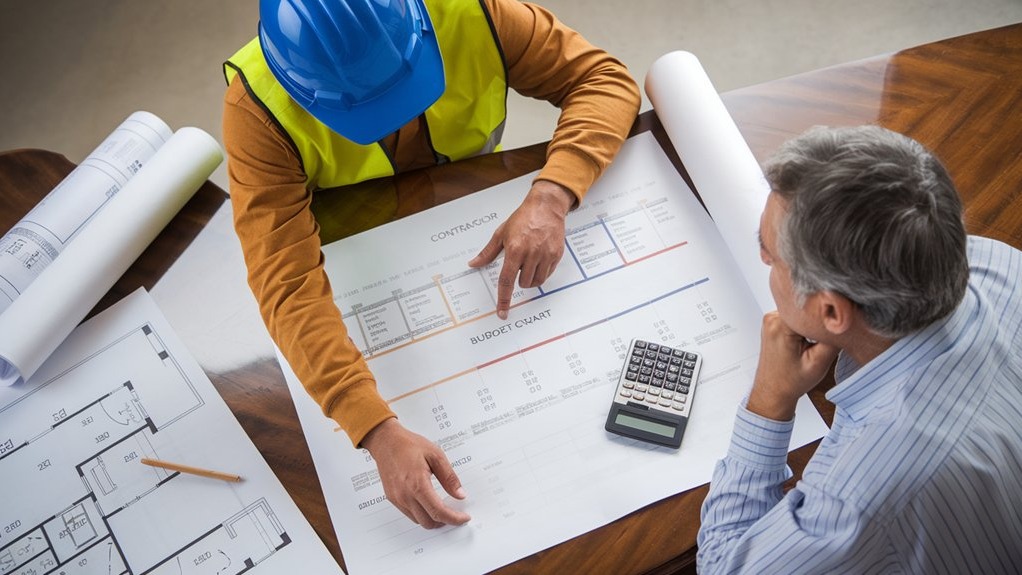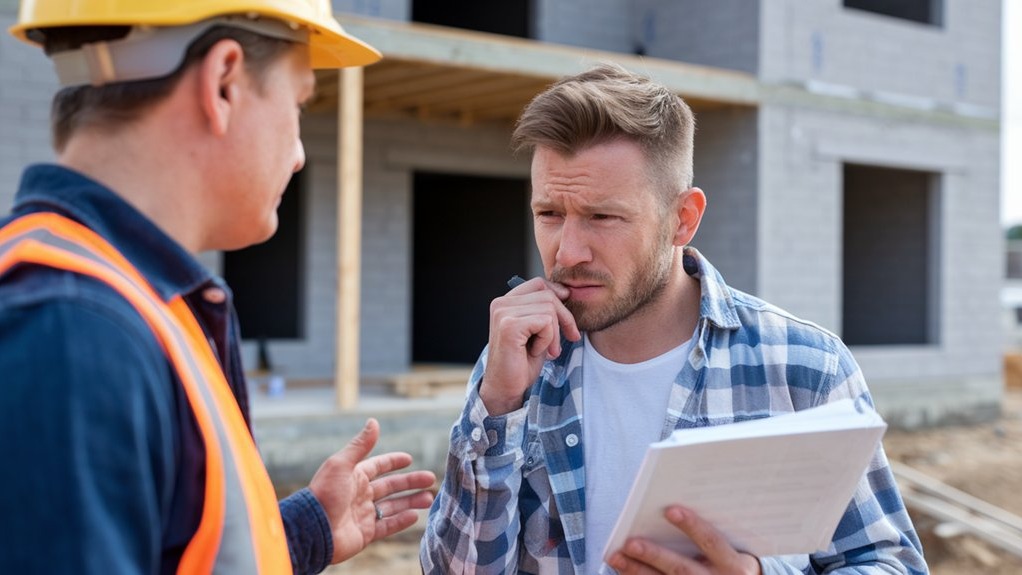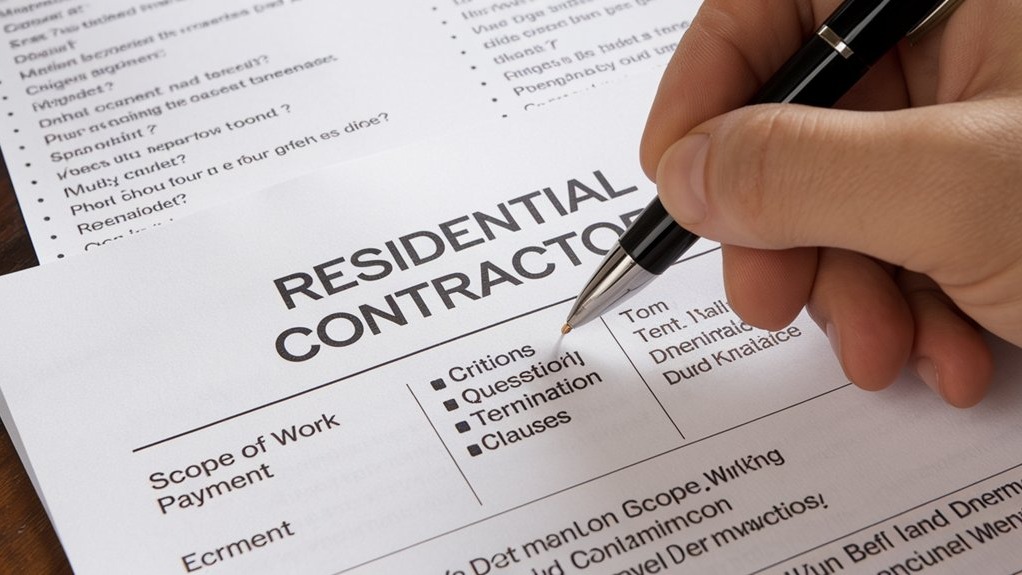Before hiring a residential contractor, you need to verify their credentials, general liability insurance, and business history. It's critical to assess their experience, especially with projects similar to yours. Understand their project management strategies and how they handle unforeseen complications. Discuss timeline expectations, budget constraints, and transparency. Evaluate their communication standards and professionalism. Make sure to review contracts and warranty coverage in detail. Don't forget to check client references and look into any potential legal disputes involving the contractor. By paying close attention to these details, you'll be well-equipped for a successful home building or remodeling journey.
Key Takeaways
Ask about the contractor's licenses, certifications, and insurance coverage to verify their credentials and business history.
Inquire about their experience, particularly with projects similar to yours, and their project management skills.
Discuss project timelines, budget planning, and how unexpected expenses or changes will be handled.
Assess their communication practices, professionalism, and customer service standards, including post-project support.
Review the contract and warranty coverage with them, ensuring you understand all terms and obligations.
Verifying Licensing and Insurance
Before signing any contracts, conducting thorough due diligence on a contractor's licensing and insurance is vital. This process, known as contractor verification, guarantees that the contractor meets all legal requirements to perform the work. For residential projects, contractors must hold specific licenses. Start by checking the state's licensing department or website to confirm the contractor's license is valid and current. Be sure the license classification matches your project's needs.
Insurance confirmation is equally important. Contractors should carry Commercial General Liability insurance, Workers Compensation insurance, and Auto Liability insurance. Don't hesitate to ask for a Certificate of Insurance for proof. This step is essential to protect yourself from potential liabilities during the project.
Assessing Experience and Reputation

Before hiring a contractor, it's essential to evaluate their business history and understand their project experience. You'll want to explore their years in the industry, past projects, and the expertise they bring to the table. This step will help you gauge their reliability, proficiency, and their potential to handle your project successfully. Furthermore, asking if they have a Class C residential contractor's license can ensure they have the necessary knowledge and legal recognition in the industry. This license demonstrates a contractor's commitment to professional growth and adherence to industry standards, offering homeowners additional confidence in their choice.
Evaluating Business History
Digging into a contractor's business history is a vital step in making a well-informed hiring decision. Business longevity isn't just about the number of years in operation, it's also about the quality and consistency of work delivered over those years. Start by confirming their licensing and certifications with state agencies. This verifies the contractor's reliability and professional competence.
Review their past projects, specifically those that are similar in scope and complexity to yours. This gives you insight into their practice and capability to manage your type of project. Next, check their affiliation with professional organizations, which often indicates a commitment to industry standards and ongoing professional development.
Insurance coverage is another essential aspect. Confirm they have current liability, property, and worker's compensation insurance. This protects you from potential financial risks associated with accidents or damages.
Reputation is equally important. Examine online review websites and seek referrals from acquaintances. Request references from previous clients and take time to contact them. Check for complaints with local consumer protection agencies and review ratings from the Better Business Bureau. This thorough evaluation will help you gauge their overall performance and business ethics.
Understanding Project Experience
Diving into project experience is essential to understanding a contractor's capabilities and reputations. Begin by reviewing examples of similar projects the contractor has completed. This will help gauge their capability and project alignment with your vision. Consider their experience with projects of similar scope and style to yours. Additionally, assess their familiarity with local building codes and regulations to prevent costly mistakes and delays.
Subcontractor management is critical, so guarantee they have experience in hiring and working with them. Examine their portfolio for a variety of projects to understand their versatility.
Next, evaluate their past performance. Ask for references from previous clients, check online reviews and ratings, and assess their track record of meeting deadlines. Their ability to handle unexpected expenses or changes is essential.
Understand their project management strategies, communication skills, and approach to budgeting. Check if they provide written contracts to protect your interests.
Last but not least, review their professional credentials. Verify their licensing and insurance status, evaluate their experience with construction permits, and check their safety protocols. A contractor with an extensive project experience will guarantee a smoother building process for your dream home.
Understanding Project Management

As you navigate the process of hiring a contractor, it's essential to understand how they manage projects. Ask about their strategies for supervision and safety measures, and how they handle multiple projects simultaneously. Their responses will give you valuable insight into their project management skills, ultimately helping you make an informed hiring decision.
Supervision and Safety Measures
Before you hire a contractor, it is vital to understand how they plan to supervise the project and guarantee safety on-site. They should have clear supervision strategies in place, meeting legal requirements like California's Business & Professions Code § 7068.1. This includes the presence of a supervisor on site to oversee the work, coordinate subcontractors, maintain safety standards, and perform quality control.
Ask about their safety protocols. They should make sure all personnel are properly covered regarding payroll, licensing, and liability insurance. They should also be on site regularly to secure the safety and protection of your property. Continuous inspection, quality control, and performance monitoring are important for the structure's safety and quality.
The contractor should be prepared for emergencies, with plans in place to review and adjust monitoring as needed. Project management best practices, like pre-construction planning, construction phase management, and seamless communication, are also significant. A detailed supervision plan, consistent documentation, and thorough project completion processes are other key factors to bear in mind. Make sure you're hiring a contractor who takes supervision and safety measures seriously.
Managing Multiple Projects
Steering through the labyrinth of managing multiple projects is no small feat – it requires a deep understanding of project management principles and tools. This involves clear role definitions, thorough planning, and meticulous real-time monitoring. It's not just about juggling tasks, but also about project prioritization and resource allocation.
One effective way to handle this is by using construction management software. This tool centralizes communication and allows for seamless collaboration among project managers, field engineers, subcontractors, and clients. It also assists in documentation, making construction workflows more manageable.
Understanding the project's different phases is essential, from pre-construction planning to completion. You'll need to manage diverse stakeholders, including architects, engineers, general contractors, and insurers.
Complex projects often require the expertise of seasoned construction management teams. Technologies such as Building Information Modeling (BIM) can help manage these projects from start to finish, reducing unnecessary costs. A lean building approach and data-driven decisions can further optimize project efficiency.
Lastly, the project manager's qualities can make or break the project. Flexibility, analytical skills, good communication, enthusiasm for challenges, and a clear project vision are key traits that you should look for.
Discussing Timeline and Budget

Steering through the complexities of a project's timeline and budget can be an intimidating task. As you consider hiring a residential contractor, it's essential to discuss these elements upfront. Regarding project timelines, you should ask for a detailed timeline, including start and completion dates. Request for a breakdown of the project into stages with respective timelines and discuss potential variables that might impact these timelines.
Budget planning is equally important. Here are three key areas you should focus on:
Detailed Cost Estimate: Request a full breakdown of estimated project costs, including material costs and labor fees.
Payment Schedule: Understand the typical payment schedule and terms. Make sure you're comfortable with the terms before signing any contract.
Contingency Planning: Discuss how unexpected expenses or changes to the project will be handled. This includes how such changes will be communicated to you.
On a final note, remember to regularly review the budget and project timelines. This will help guarantee that your project stays on course and within budget.
Evaluating Customer Service

In the domains of construction and home improvement, excellent customer service is as vital as the quality of the physical work done. The service provided by your contractor can greatly influence your overall satisfaction with the project.
To evaluate customer service, consider how the contractor communicates with you. They should provide regular updates, respond promptly to inquiries, and resolve issues efficiently. Transparency in communication is essential for client satisfaction. The contractor should have feedback mechanisms in place, enabling you to voice your concerns and suggestions.
Weigh the contractor's professionalism. Look for punctuality, a respectful attitude, and evidence of their expertise. They should provide client references and hold relevant professional certifications.
Assess the quality of the contractor's service. They should prioritize your needs, offer post-project support, and maintain high service standards. Watch for their willingness to improve based on client feedback.
Lastly, make sure they set clear expectations about the project and understand your needs. They should manage your expectations effectively, educate you about the process, and align their services with your goals. By carefully evaluating these factors, you can guarantee a positive experience with your residential contractor.
Reviewing Contract and Agreements

Before you sign on the dotted line with your contractor, it's essential to thoroughly review the contract and understand its structure. Be wary of any price contingencies that could inflate your costs down the line. Always consider having a legal professional review the agreement to guarantee your interests are protected.
Understanding Contract Structure
Diving into the domain of residential construction contracts, it is essential to comprehend the structure and key components. Understanding the contract terminology and its compliance requirements can save you from unnecessary headaches later.
The contract is composed of several important sections, each serving a vital role. These include:
Identification of Contract Parties: Clearly specifies the names and addresses of the homeowner and contractor.
Detailed Scope of Work: Describes the project, including services and materials to be provided.
Payment Terms: Outlines the estimated costs, payment schedules, and penalties for late payments.
You'll also encounter important clauses detailing the property, insurance, publicity terms, and conditions for ending the contract.
Beyond these, the contract should clearly outline the obligations of both the contractor and the homeowner. It should also specify the process for making changes to the project and mechanisms for dispute resolution.
Lastly, pay attention to appendices and attachments containing relevant documents, state-specific language, and the delivery method. Remember, the more familiar you are with the contract structure, the better equipped you'll be to guarantee a smooth and successful home renovation project.
Assessing Price Contingencies
Upon examining the structure of a construction contract, it is vital to explore the concept of price contingencies. These are funds set aside to cover unforeseen project costs, playing a significant role in contingency planning. They help mitigate risks for contractors, especially in contracts with guaranteed maximum prices (GMP).
Price contingencies come in two forms: contractor contingency and owner's reserve. Contractor contingency is money included in the contractor's budget to account for unexpected costs, typically ranging from 5-10% of the total budget. These funds cover minor changes, missed details, and cost growth. On the other hand, the owner's reserve is set aside for scope modifications and additions, covering minor force majeure events and permit approval issues.
Transparency and communication are key when dealing with contingency clauses. Both parties should conduct a thorough risk assessment before work begins. This discussion must be ongoing, with clear communication about requests for and decisions regarding the allocation of contingency funds. Finally, a shared savings clause can be included, dictating how unused contingencies should be distributed. Remember, contingency funds should be managed with clear understanding of authority and timing for assignment.
Importance of Legal Review
Maneuvering the maze of contract terms and agreements requires a keen eye and deep understanding of legal language. It's easy to overlook key legal obligations or misinterpret legal jargon. Consequently, it's essential to have your contract reviewed by a legal expert.
Legal review is a vital step in contract compliance and risk management. It guarantees the contract adheres to applicable laws and regulations, identifies and clarifies ambiguous clauses and helps prevent potential disputes.
Here are three top benefits of professional contract review:
Prevents Misunderstandings: With clear contracts, misunderstandings and disputes can be minimized.
Protects Interests: Legal review guarantees that the contract protects your interests as a homeowner.
Peace of Mind: A professionally reviewed contract provides peace of mind, knowing that potential legal risks have been identified and mitigated.
Upon review, pay extra attention to payment clauses, termination for convenience terms, and liquidated damages conditions. Validate your contract complies with all relevant laws and regulations. Remember, investing in a thorough legal review now can save you from costly legal issues down the line.
Checking Business History

When hiring a contractor, a thorough background check is your road map to peace of mind. Don't overlook the importance of investigating their business history. A robust probe into their past operations can reveal a lot about their business reputation and client satisfaction.
Start with verifying their licenses, certifications, and insurance coverage. These are critical in demonstrating their commitment to industry standards and local regulations. Use state licensing boards or online verification portals for this purpose.
Next, assess their financial stability. Conduct credit checks and look into any bankruptcy records, outstanding liens, or judgments against them. A healthy financial background can assure you of their ability to manage and complete your project.
Evaluating their legal and ethical standards is equally essential. Conduct a criminal background check and research any legal disputes or lawsuits involving them. Ensuring their compliance with labor laws can protect you from potential liabilities.
Lastly, review client feedback. Online reviews, client references, and testimonials can provide an insight into their work quality and reliability. Check for any complaints filed against them and their rating with the Better Business Bureau. A contractor with a history of satisfied clients is likely to deliver a satisfactory result for you too.
Probing Project Experience

Before you entrust your project to a contractor, it is crucial to explore their project experience. This step will give you insight into their ability to handle the project complexity and determine if they possess the specialized skills your project may require.
Years of Experience and Relevant Projects: Start by asking about their overall years in the industry. Specifically, have them share examples of similar projects they've completed. This will provide a glimpse into their experience with the type of job you're planning.
Project Management Experience and Specialized Skills: Inquire about their experience in managing commercial or residential job sites. Find out if they have any specialized skills or certifications that would be relevant to your project.
Project Complexity and Execution: Ask about their experience with projects of similar complexity, and how they guarantee project execution aligns with plans. Clarify how they handle potential risks, how they comply with laws, and their warranty policy.
Establishing Communication Standards

Ensuring your construction project's success hinges on establishing clear communication standards. You need to determine a chain of command for communication. The architect, for instance, communicates with consultants, while the general contractor liaises with suppliers and subcontractors. The superintendent is generally your primary contact, and contract documents will guide all construction communication. Unauthorized direct communication could spell trouble.
Different communication methods have various advantages. Emails are perfect for quick updates, while meetings suit complex discussions. Communication protocols should include specific forms and submission methods for RFIs, change orders, and daily reports. Meetings should not only clarify roles but also seek feedback. Remember, documentation practices demand that all communication, even verbal, be documented with notes and follow-up emails.
The clarity of communication cannot be overstressed. Avoid jargon and keep messages focused. Be detailed but use as few words as possible, and always proofread your written communication. Professionalism is crucial – avoid foul language or emotional language. If emotions run high, take a breath and review your message before sending. Finally, establish a clear schedule for updates and communication with the owner and architect.
Determining Warranty Coverage

Deciding on warranty coverage is a crucial step in the process of hiring a contractor. You must understand the different warranty types and their respective coverage durations to guarantee your home's protection.
Five warranty types are commonly offered by contractors: Material and Equipment, Callback, Workmanship, Structural, and Habitability. Each provides different levels of coverage. For instance, a Workmanship Warranty guarantees services are defect-free, while a Structural Warranty covers significant defects affecting your home's integrity.
The coverage durations vary:
One-Year Coverage typically includes workmanship and materials.
Two-Year Coverage extends to mechanical systems.
Longer coverages, like Six-Year or Ten-Year, generally protect against major structural defects.
These warranties serve as contractual assurances, legally binding, and sometimes mandatory depending on your jurisdiction. They protect your profits, promote quality, off-load risks, set clear expectations, and guarantee your home's protection. Be sure to ask your contractor about these warranties and their durations to keep your investment safe. Remember, the right warranty coverage can make a huge difference in your home's long-term value and your peace of mind.
Frequently Asked Questions
Do You Provide Green or Sustainable Building Options?
Absolutely, you'll find we use sustainable materials extensively in our projects. We're committed to energy efficiency, working hard to maximize it in every home we build, therefore reducing environmental impact and saving you money.
What Type of Ongoing Maintenance Is Required After Project Completion?
You'll need regular, corrective, preventative, and emergency maintenance post completion. A detailed maintenance schedule should be provided to guarantee the ideal care and longevity of your newly built or renovated residential property.
How Do You Handle Unexpected Problems or Delays During the Project?
When unexpected problems arise, you'll need robust cost management and communication strategies. You'll address issues promptly, keep clients informed, and adjust budgets as needed, ensuring the project remains on track despite any unforeseen challenges.
Can You Provide Digital Updates and Progress Reports During the Construction Process?
Absolutely, you'll receive digital updates for superior project management. Our team guarantees efficient client communication via real-time progress reports, so you're always informed about your project's status and any necessary adjustments.
What Measures Do You Take to Ensure Quality and Satisfaction Throughout the Project?
You implement a rigorous quality assurance framework, conducting regular inspections, audits, and seeking client feedback. Constant monitoring guarantees adherence to quality standards, promising satisfaction with the final outcome of the residential project.
Conclusion
Before you hand over your keys to a contractor, make sure you've asked the right questions. Think of your home as a treasure chest; it's priceless, filled with precious memories. As its guardian, it's your responsibility to thoroughly vet anyone who interacts with it. So, scrutinize their credentials, experience, and communication skills. Investigate their business history and project management abilities. Your home deserves a contractor who values it as much as you do.
 Add Row
Add Row  Add
Add 




Write A Comment